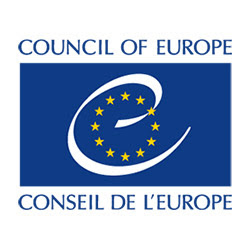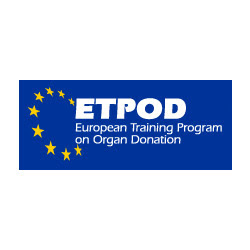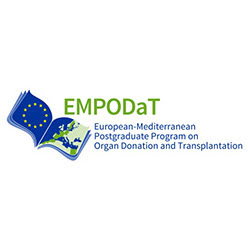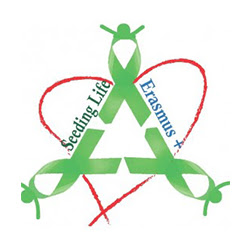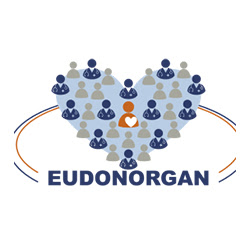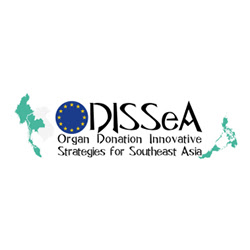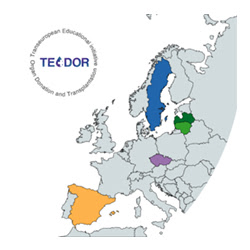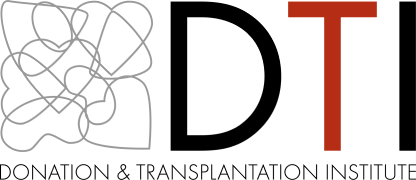Black Sea Area Project
The Council of Europe launched in 2011 a three-year collaborative project that aims to battle organ shortages and to improve access to transplant health services in the Council of Europe BSA member states (Armenia, Azerbaijan, Bulgaria, Georgia, Moldova, Romania, Russian Federation, Turkey and Ukraine) through the development of safe and ethical donation and transplantation programmes.
Efforts are mainly being directed towards the development of effective legislative frameworks and the establishment of national transplant authorities and national transplant programmes and infrastructures. Specialists in the field of transplantation from countries with established transplant systems, such as France, Italy, Czech Republic, Portugal and Spain, are participating and supporting experts from BSA countries.
The BSA project has been organised into several Work Packages that focus on different aspects of the various donation and transplantation processes, which are based on the level of development of the already existing transplantation activities in each BSA member state.
Objectives
The intention is to create a permanent network of national experts that will allow participant countries to coordinate their efforts and pool resources.
DTI Foundation and Organización Nacional de Trasplantes are in charge of the Working Package 4 about clinical practices, that focuses on analysis of the clinical practices for the donation-transplantation proecess inside hospitals. The countries participing (Romania, Russia Federation and Turkey) have established National Transplant Organisations and have fully functional living and deceased donation programmes.
Links
25th February 2013 – “Oradea, the champion in organ donation. What is the secret? “. Spokespeople: Maria Paula, DTI Foundation Medical Director and Joao Paulo Sousa, ICU and Emergency Director of the Coimbra University Hospital (Media: Digi 24, Romania)
Team
María Paula Gómez, DTI Foundation Medical Director
Xavier Guasch, Hospital Clínic de Barcelona
Jacinto Sánchez, Regional Transplant Office from Galicia, Spain
Ata Bozoklar, Bilim University Istanbul, Turkey
Víctor Zota, National Transplant Agency, Bucharest
Methodology
The BSA Project has been organised in several Work Packages that will focus on different aspects of the donation and transplantation processes based on the level of development of the already existing transplantation activities in each BSA member state.
DTI Foundation and Organización Nacional de Transplantes (Spain) is the work package leader of clinical practices. This Work Package focuses on analysis of the clinical practices for the donation-transplantation process inside hospitals. The participating member states are: Romania, Russia Federation and Turkey.
In order to approach the different levels of the deceased donation system (National, Regional and Hospital) four types of surveys have been developed:
The National Level Survey was created to be answered by the nationals transplant offices or by transplant representation by the Minister of Health.
The Regional Survey is fouced on regional organizations.
The Hospital Surveys are two and are addressed to transplant coordinators and another to intensive care doctors.
The first countries to apply and answer this tool were Turkey and Romania. In both cases, the specific surveys were provided by DTI Foundation and health care professionals answered his specific survey (National level, Regional or Hospital).
European educational initiative through TPM-DTI for better donation and transplantation results in the Republic of Moldova
Education is a main factor for improving donation and transplantation results. Within the twinning project Strengthening the Transplant Agency of the Republic of Moldova and support in legal approximation in the area of quality and safety of substances of human origins (MD10/ENP-PCA/HE/11b) funded by the European Union, Transplant Procurement Management – Donation Transplantation Institute (TPM-DTI), Spain, along with the Catalan Transplant Organization (OCATT), Spain, Agence de Biomédecine, France, the Transplant Agency of the Republic of Moldova (RM) and their collaborative experts, designed, developed and implemented in compliance with the Guide to the quality and safety of organs for transplantation, Council of Europe, a two level educational initiative aimed at meeting the training needs of the Moldavian health care professionals involved in organ donation (D), transplantation (T) and tissue banking (TB).
Objectives
To train 80 people working in the Moldovan health care system (transplant coordinators, liver and kidney transplant professionals, tissue bank staff, the professionals of the Transplant Agency and from the Ministry of Health) on the basis of EU and international best practices.
Methodology
Face to face (F2F) and online (OL) training was provided to two different target groups: healthcare professionals working or about to join D&T&TB, and key professionals able to change D&T&TB practices in their centers. Theoretical sessions blended with practical activities to reinforce the knowledge acquired. Participants debated clinical cases and attended hands-on learning sessions. Continuous and final evaluation was performed. Moreover, pre-course tests were implemented for comparison. Virtual classrooms were created for all the F2F courses to facilitate knowledge retention during training.
Results
Of all attending participants (n=115; 93,33% MDs) 34 attended the F2F organ donation course, 45 the F2F transplantation course and 36 the F2F tissue banking course. Of them, 10 professionals joined the TPM-DTI OL programs in organ procurement and tissue banking. Medical knowledge increased with 17,26% (D), 14,19% (T) and 13,16% (TB) by the end of the training. Academic programs were scored with 4,58 (D), 4,71 (T) and 4,33 (TB) and organizational aspects were evaluated between 4,41 and 4,80 (5 – excellent to 1 – poor).
Conclusions
The educational initiative has been part of a European multifactorial approach that has been tackling various key aspects such as education, awareness, legislation, operational and best quality standards in D&T&TB in RM. Further recommendations have been given to continue in a sustainable way the educational program and provide well trained professionals for better results.
ETPOD

The European Training Program on Organ Donation (ETPOD) was a Pan-European initiative that aimed at solving the lack of formal training programs in the field of organ donation. lt covers different educational levels, from basic knowledge among healthcare professionals, to specialized training for donor coordinators and hospital managers.
Organ shortage is the major limiting factor for transplant program development. As a result, waiting lists continue to grow. About 60,000 European citizens are currently on a donation waiting list, hoping to receive an organ that could save their life. However, nearly 10 – 30% of them will die without having the opportunity to receive a graft. Moreover, there are wide differences in how European countries organize their deceased organ procurement programs, which results in different donation rates ranging from 1.6 in Bulgaria to 34.4 in Spain in 2009.
Best practice analysis shows that the presence of a trained donor coordinator in every hospital is a key factor to increase donation rates.
ETPOD project was co-funded (60%) by the European Commission’s EU Public Health Programme (DG-Sanco 2005205). Its consortium included 20 partners from 17 European countries, selected according to their level of interest in the project, organizational model and pmp rates (from the lowest to the highest rates in Europe). Partner organizations ranged from State Agencies to Universities.
The project main objectives were:
- lncrease organ donation knowledge at large scale
- Maximize the growth of organ donation rates
- Disseminate training in a reliable and effective way
By means of:
- Designing a training program at 3 different professional levels
- lmplementing the training programs in 25 Target Areas (TA)
- Measuring the impact on donation rates after training implementation
Objectives
- To build a solid European collaborative partnership in the organ donation-transplantation process that will enable to respond to the growing demand of organ replacement therapy by increasing donation rates.
- To train Health Care Professionals from the European Union countries with the aim of providing them with the know-how, competences and motivation in the organ donation process, to grow to be Transplant Coordinators and lead organ donation-procurement programs in an efficient and successful way.
- To design and validate a professional European Training Program On Organ Donation (ETPOD) at different involvement levels
Results
All the foreseen courses were successfully implemented. The pedagogical objectives were achieved by training a total of 3291 healthcare professionals in the 25 TAs.
The number of utilized donors in the TAs increased from 15.7 ± 14.3 (95% CI: 9.8-21.6) to 20.0 ± 17.1 (95% CI: 13-27.1) (P = 0.014) and the number of organs recovered increased from 49.7 ± 48.5 (95% CI: 29.6-69.7) to 59.3 ± 52.1 (95% CI: 37.8-80.8) (P = 0.044).
Links
Click here to visit the project’s website.
Methodology
The methodology of the project responds to the cycle of: analysis of the country’s current situation, designing of adapted training program to the needs, validation and implementation of the program, follow-up, evaluation and, finally, analysis its transferability observing again the country’s current situation.
The strategy is sustained on the awareness that each participant country has different donation rates per million inhabitants (pmp); therefore the project includes the following actions:
- Transfer of the accomplished expertise between countries with higher organization development within the process and those with less scope considering for the training programs international faculty staff from the different partner countries
- Development of a European training program on organ donation addressed to different professionals’ profiles involved in the donation process at National, Regional, Local and Hospital levels
- Design and adaptation of specific contents to be developed in accordance to the analysis of educational needs previously identified in each Target Area (TA)
Within this framework the learning methodology to implement the ETPOD will be based in two modalities: Blended learning and face-to-face training. Learning occurs when a series of processes takes place ending with the new knowledge assimilation and objectives accomplishment.
The experience-based learning action, that Transplant Procurement Management (TPM Project) as part of IL3, Institute for LifeLong Learning has successfully used, allows participants to acquire: up to date focused knowledge, development of the Know-how (professional competences and skills), the Show-how (performance of good practices) to finally enable them to perform concrete actions -Do- (application of the newly acquired knowledge and experience adapted to their own reality). Each WP defines a set of sequential actions to give fulfilment to the expected results.
EMPODAT

EMPODaT, the European-Mediterranean Postgraduate Program on Organ Donation and Transplantation, is a TEMPUS project funded by the European Commission, the Education, Audiovisual and Culture Executive Agency (EACEA), to develop and implement a Postgraduate Program on Organ Donation and Transplantation, in accordance with the European Space for Higher Education guidelines. It will employ a blended learning methodology and will provide a common framework, where Universities from 4 different European countries and 3 countries benefitting from the European Neighbourhood Policy Partnership Instrument (ENPI) will collaborate actively to develop a successful lifelong learning strategy.
It is addressed to healthcare professionals involved or about to join Organ Donation and Transplantation in Morocco, Egypt and Lebanon and aims at setting the base for a European-Mediterranean Training Model of Specialists in Organ Donation and Transplantation.
This may result in the development of safe and quality transplant systems in the Mediterranean area as the training of healthcare professionals is proved to have a positive impact upon organ donation (see ETPOD article).
Objectives
- To design a Postgraduate Program for Specialists in Organ Donation and Transplantation, conceived as a blended training program, in accordance with the European Space for Higher Education guidelines, and the needs of ENPI participant countries, based on a common curriculum and certification degree (ECTS).
- To develop academic and scientific contents and tools and include them in an e–learning platform that will allow students from ENPI Universities to be trained as specialists in Organ Donation and Transplantation in the framework of the Bologna three cycle structure.
- To train a group of 12 ENPI teachers who will become the faculty and coordinators of EMPODaT in their countries and will provide training to 90 ENPI students.
- To generate a consulting network with the participation of universities and other allied institutions, regional, national and international bodies in Organ Donation and Transplantation to ensure the transferability of EMPODaT.
Results
Results are currently being centralized. We will post them shortly.
Links
Click here to visit the project’s website.
Methodology
Phase 1. EMPODaT Design
A diagnosis study has carried out considering the following issues:
- Current educational training programs on organ donation and transplantation in the consortium countries (EU+ENPI)
- Skills and knowledge of health science students in organ donation and transplantation (ENPI Universities)
- Accreditation (ECTS) stipulations in the ENPI universities and competent authorities for higher education in order to meet the requirements of accreditation standards
- Analysis of organ donation and transplantation activity in ENPI countries
- Evaluation of internet access and digital literacy in ENPI countries
Based on diagnosis study results, the consortium draw up a plan agreed by all partners for joint actions to create a homogenized EMPODaT curriculum.
Phase 2. EMPODaT Development
EMPODaT include the following academic modules:
“Learn to Teach” Educational Program
Beneficiaries: 12 ENPI Faculty Staff (2 members from each ENPI University: 1 Academic and 1 Management Coordinator) that will constitute the EMPODaT faculty.
“Postgraduate Program on Organ Donation and Transplantation” include:
- Organ Donation online module (5 ECTS): October-December 2014.
- Organ Transplantation online module (5 ECTS): January-March 2015.
- Organ Donation and Transplantation local seminars (5 ECTS): organized throughout the 8 months of EMPODaT implementation (flexible schedule).
- Donation and Transplantation hospital traineeships (5+5 ECTS). November 2014- April 2015.
- International assessment face to face seminar (5 ECTS): May-June 2015. One course take place in each ENPI Country: Lebanon, Morocco and Egypt with the support of tutors from EU and ENPI universities.
Beneficiaries: There are a total of 90 students from the 6 ENPI Universities (15 per each). Students’ selection is performed on basis of gender equality and profile diversity
Phase 3. EMPODaT Implementation and Follow up
EMPODaT are implemented in the 6 ENPI Universities between October 2014 and July 2015, will last 10 months and correspond to 750 hours (30 ECTS). It provide with knowledge abilities and skills that will enable students to undertake future organ donation and transplantation activities, according to the requirements and characteristics of their profession.
Upon successful completion, students are certified.
A project quality control, follow up and evaluation system are designed and implemented to ensure the efficient implementation of the educational program.
SeeLife
SeeLife project aims to improve knowledge, skills and professional competences in Organ Donation and Transplantation in Bulgaria and Latvia, setting the bases for best practices in alignment with the EU directives.
The project targets healthcare professionals at university level, as well as physicians already specialized or in training from critical care medicine, emergency and recovery units, neurologists, neuro surgeons, transplant surgeons and transplant physicians.
Objectives
- To design, develop and implement a two level training program in Organ Donation and Transplantation for healthcare professionals in Bulgaria and Latvia. The project aims at improving the quality and relevance of the continuous education in the field and, strengthening the European society of medical professionals involved in the Organ Donation and Transplantation process.
- To ensure the program sustainability through a professional network in Organ Donation and Transplantation, to be constituted with the participation of universities and other allied institutions, regional, national and international bodies.
Methodology
The project methodology covers the following steps:
- Define five Target Areas (TAs) within Bulgaria and Latvia. TAs were selected according to the following criteria: to have at least 1 donor hospital and 1 transplant hospital, covering a population over 300.000 inhabitants.
- Perform a diagnosis study in the TAs defined. The diagnosis study analyzed the organ donation and transplantation activity in the partner countries, the current existing educational programs, the professional needs and interest in continuous education in the field as well as access to internet and digital literacy.
- Develop academic and scientific contents for the two level training program, in accordance with the European Space for Higher Education guidelines (ECTS).
- Implement the training program in II Phases:
- Phase I: Learn to Teach. A total of 10 healthcare professionals from Bulgaria and Latvia will be trained to become trainers and coordinators in Phase II. Blended learning methodology, including on-line and face to face sessions, will be used.
- II Phase: National Seminar. A total of 15 national seminars in Organ Donation and Transplantation will be organized in the selected TA, with a total of 375 beneficiaries.
Consortium
Promotor: Multiprofile Hospital for Active Treatment and Emergency Medecine Pirogov, Sofia, Bulgaria
Partner 1: Universitat De Barcelona (UB), Barcelona, Spain
Partner 2: Donation & Transplantation Institute (DTI), Barcelona, Spain
Partner 3: Paula Stradina Kliniska Universitates Slimnica As, Riga, Latvia
EUDONORGAN


The project ¨Training and social awareness for increasing organ donation in the European Union and neighbouring countries¨ (EUDONORGAN) is a service contract awarded by the European Commission from the European Union budget, on the initiative of the European Parliament. It aims to develop and implement two types of activities at EU level, focusing on training and social awareness for increasing organ donation in the European Union and neighbouring countries.
The EUDONORGAN project is developed by an international consortium led by University of Barcelona – Bosch i Gimpera Foundation, together with Donation and Transplantation Institute (DTI Foundation), Spain. The consortium partners are: The Institute for Organ and Tissue Transplantation of the Republic of Slovenija, Slovenija-transplant; The Institute for Transplantation and Biomedicine – Ministry of Health of the Republic of Croatia; Italian National Transplant Centre – Italian National Institute of Health, Italy, and Dinamia S. Coop., Spain.
The project consists in two core WPs: Train the Trainers (W1) and Social Awareness (W2), and two horizontal WPs: Dissemination (WP3) and Evaluation (WP4).
The Train for Trainers work package, led by the University of Barcelona and DTI Foundation, will assist and provide experts in organ donation (tissue and cell donation will be also addressed) and other relevant actors with knowledge, educational strategies and communication techniques to monitor and improve overall performance in the management of donated and transplanted organs. The training program will be based on active learning and adult learning principles and it will employ a blended learning methodology by means of e-learning (via WebApp) and face to face training.
The Social Awareness work package, led by the Institute for Organ and Tissue Transplantation of the Republic of Slovenija, Slovenija-transplant, and the Institute for Transplantation and Biomedicine – Ministry of Health of the Republic of Croatia, will aim at organising and implementing six communication events, each of them taking place in different EU Member States.
The Dissemination working package, led by the Italian National Transplant Centre – Italian National Institute of Health, Italy, aims to ensure that the tender, its results, products and deliverables resulting from the two core working packages are known and made available specifically to DG SANTE, all the target groups, direct beneficiaries, any other identified stakeholders, including the general public. It is the intention of the EUDONORGAN consortium to guarantee a proper visibility of the findings of the two fields covered by the service.
The Evaluation working package, led by Dinamia S. Coop., Spain, specialised in consultancy and evaluation of healthcare projects, will ensure that a systematic and continuous appraisal of the contract is performed, in terms of contract development and of the quality and impact of the results achieved.
The project will reach approximately 350 to 400 participants from the EU and neighbouring countries, including healthcare professionals and other relevant players such as: patients and patient support groups; representatives of public and governmental agencies, representatives of health institutions, opinion leaders and the media.
KeTLOD
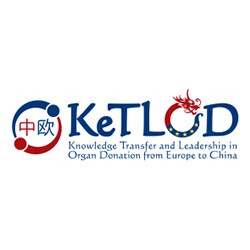
The most recent project in where DTI Foundation together with the University of Barcelona are the main coordinators is the KeTLOD project; “Knowledge transfer and leadership in Organ Donation, from Europe to China” cofounded by European Commission under the program “Erasmus+ Capacity Building in Higher Education”.
The main objective of KeTLOD project is to design and implement a postgraduate program in organ donation, customized to the needs of the Chinese health care professionals and adapted to the characteristics of the High Education system in China. This post-graduation program will be implemented in seven universities; crucial in terms of educational background and education capacity and their geographical position covering the main regions of mainland China. The KeTLOD curriculum is conceived as blended training program, in accordance with European Space for Higher Education guidelines and will offer knowledge and experience in clinical approach, management and dissemination strategies in Organ Donation and it consists in a 625 hours’ program that will lead to 25 ETCS.
KeTLOD curriculum, translated in Chinese language, will empower professional competences of the health care professionals in China; enhance the detection and referral of potential donors and through the dissemination of knowledge and information will encourage a positive attitude towards donation in the society.
Additionally, within this project, through organizing joint activities for higher education organizations, the partners are committed to build a knowledge network between European Universities and Chinese Universities
The consortium of the project is based on the work of a set of key actors in training in organ donation, University of Barcelona and DTI foundation along with two other Universities with extensive experience in trainings and who have previously worked in communication, dissemination and awareness in organ donation, University of Bologna and University of Nice. To assure a correct working plan and quality protocols DINAMIA will play an important role. Meanwhile to support the dissemination activities in China the Shenzhen XinGeRuiLa Culture Communication Co. Ltd. (XGRL) is added as partner to the KeTLOD consortium.
The project will be implemented in the following universities in China:
- Shanghai Jiao Tong University (SJTU) – Renji Hospital
- Hospital Capital Medical University (CCMU)
- Kunming University (KU)
- Wuhan University (WHU)
- Second Military Medical University Shanghai (SMMU)
- Nanchang University (UN)
- Guangxi University of Chinese Medicine (GUCM) – Transplant institute of medicine Nanning
This consortium will create a knowledge society foreseen as a starting point of further collaboration between China and Europe in education; training, health (more concretely organ donation) and culture exchange.
The KeTLOD project will have a duration of 2 years and as main outcome will be 14 Chinese experts in Training on Organ Donation and 140 healthcare students issued with a postgraduate diploma in Organ Donation.
Latest news
After closing successfully, the first phase of Training the Trainers in where 22 Chinese experts were specialized in teaching organ donation at a university program level; the Chinese universities have selected their students and launched the postgraduate KeTLOD in their respective teaching program. A total of 144 students were selected following the selection criteria established by the consortium and enrolled in the KeTLOD program.

These students will be the first generation that will receive a KeTLOD diploma in Organ Donation issued from the Chinese Universities, equivalent to 25 ECTS and recognized by the European consortium universities.
Each university successfully launched their courses and organized an official opening ceremony in where representatives from the national authorities and from the Spanish embassy joined. The vice president of the respective universities together with the Dean of the partners hospitals were also among the ceremony guests. Messages of dedicated support to the project implementation were delivered by these authorities.

As part of the postgraduate implementation action local seminars were performed by each university with their respective students. The Chinese trainers led successfully the seminars and the skills they have previously acquired were successfully put into action during the seminars. Introduction and basic knowledge in the field of organ donation were explain to the students. Moreover, practical workshops were performed and open discussions between the students and the trainers were done during the whole seminar.
Up to date the six universities have performed their local seminars in Beijing, Shanghai, Nanchang, Kunming, Wuhan, Guangxi.




With a great satisfaction of accomplishment, we all look forward to the next step of the KeTLOD implementation!
Visit ketlod.com.cn for more information.
ODISSeA – Organ Donation Innovative Strategies for Southeast Asia
ODISSeA – Organ Donation Innovative Strategies for Southeast Asia is an Erasmus+ project funded by the European Commission under the program “Erasmus+ Capacity Building in Higher Education”. The main objective is to design and implement an academic postgraduate program on organ donation in 8 universities from Malaysia, Myanmar, Philippines and Thailand (SeA countries) in accordance with the European Space for Higher Education guidelines. The project is the result of the cooperation of fourteen institutions from Southeast Asia (SeA) and the European Union. From the European side, the University of Barcelona is the leader and organizer of the project, together with the University of Bologna, Italy, University of Zagreb Medical University, Croatia, DTI Foundation, Spain, and Dinamia S. Coop., Spain.
The origin of the project comes from the need for a specialized training program that builds adequate knowledge, skills and attitude in organ donation to improve the number of well-trained specialists that will efficiently coordinate the process of organ donation in the SeA countries.
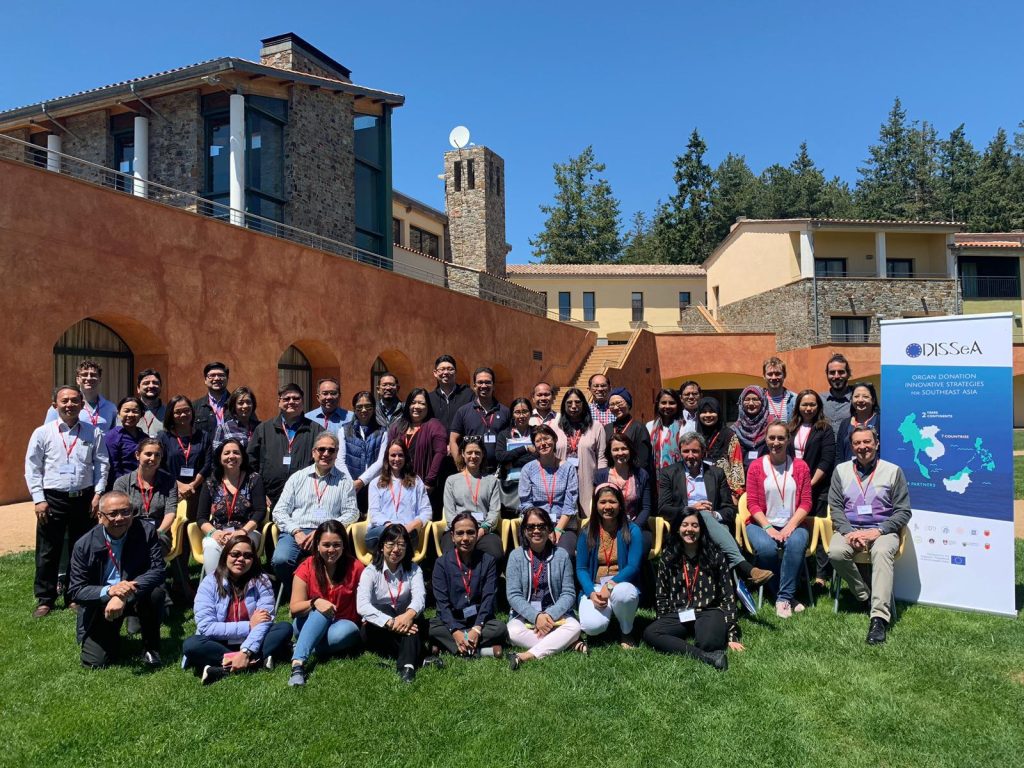
The postgraduate academic program to be developed and implemented will provide a common framework where Universities from 3 European countries and 8 Universities from SeA countries to develop a student-centered lifelong learning strategy corresponding to highly specialized knowledge in organ donation, with specific problem-solving skills and the responsibility of managing and transforming organ donation through strategic approaches. Upon successful completion, an accomplishment diploma validated and accredited by SeA universities will be issued (750 hours or 30 ECTS). Upon completion of the project, the Higher Education Institutions (HEIs) will have implement a suitable adapted postgraduate program on organ donation curricula, according to the stipulations and requirements established in each partner SeA University and validated by local and EU experts, which will respond to the educational needs identified during the project.
TEODOR Project –Transeuropean Educational Initiative in Organ Donation and Transplantation
TEODOR is an Erasmus + Project of Cooperation for innovation and the exchange of good practices co-funded by the European Commission.
This project aims at designing and piloting a new and innovative training program on organ donation and transplantation for relevant healthcare personnel from Latvia, Czech Republic, and Lithuania. The project is led by Pauls Stradins Clinical University Hospital (Latvia), with the collaboration and expertise of Spanish and Swedish partners.
The partner organizations in the project are: TPM – DTI Donation & Transplantation Institute and Universitat de Barcelona (Spain), National Transplant Bureau under the Ministry of Health (Lithuania), Fakultní nemocnice Královské Vinohrady (Czech Republic), Skane Lans Landsting (Sweden), and Latvijas Universitate (Latvia).
The purpose of this project is to improve technical and non-technical competencies required in organ donation and transplantation for better clinical performance and patient outcome, and boost best practice exchange among countries, with the ultimate aim of better donation and transplantation activities that can save and improve the lives of hundreds and thousands of patients on the donor waiting lists.
Target Groups:
- for organ and tissue donation – Key Donation Professionals (KDPs) such as healthcare personnel from Intensive Care Units, Emergency Departments, Neuro-critical wards, organ donor/transplant coordinators;
- for organ transplantation – the Key Transplantation Professionals (KTPs) such as Immunologists, transplant surgeons, nephrologists, hepatologists, cardiologists, pneumonologists, etc.
The project results foreseen are prospective study in the three beneficiary partner countries (Latvia, Czech Republic and Lithuania) and scientific publications. It is important to highlight the development of the Train the Trainers Curriculum for the experts from each participating country. The last outcome will be a total of 75 healthcare professionals trained (15 KDPs from Latvia, Czech Republic, and Lithuania about organ donation and 15 KTPs from Latvia and Lithuania about organ transplantation).
The Impact and potential longer-term benefits envisaged will be better awareness at different societal levels, including individual, healthcare professionals (both directly involved and others) and decision makers.
At local and regional level:
- For trainers and learners: better technical and non-technical competences;
- For patients: more potential donors identified, better transplant programmes, less patients on the waiting list, better short- and long-term transplant outcomes, higher quality of life;
- For hospitals: better donation and transplantation programmes in place. Empowerment of Intensive Care Units, Emergency and central services of the hospital.
At national level, TEODOR will impact positively to National Agencies on development of organ exchange programmes and help us to work with the same rules and have equal knowledge.
At European level we expect TEODOR may create better compliance with the European recommendations and best practice exchange among Baltic, Southern, Central and Northern European healthcare professionals to improve organ donation and transplantation practices.
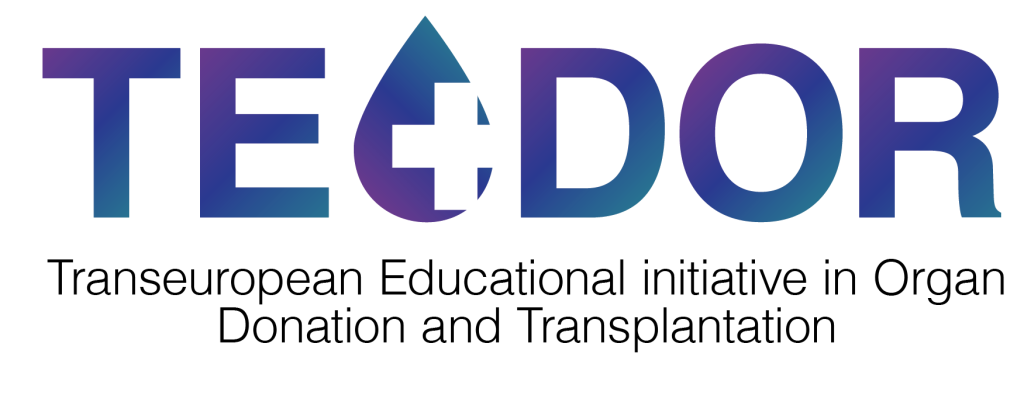

Disclaimer: The European Commission's support for the production of this publication does not constitute an endorsement of the contents, which reflect the views only of the authors, and the Commission cannot be held responsible for any use which may be made of the information contained therein.




